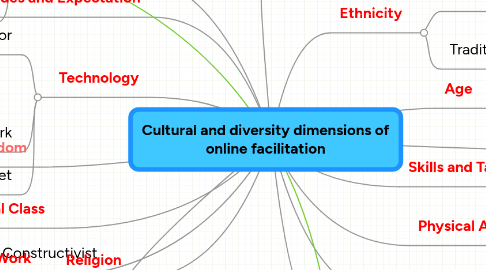Cultural and diversity dimensions of online facilitation
создатель James Wanless


1. Education
1.1. Level of Study
1.2. Attitudes towards Education
1.3. Educational Background
2. Social Class
2.1. Socio-Economic Status
3. Learning Styles
3.1. Constructivist
3.2. Connectivist
3.3. Behaviourist
3.4. Cognitivist
4. Religion
5. Technology
5.1. Computor
5.1.1. PC
5.1.2. Mac
5.1.3. Graphics
5.1.4. Academic
5.2. Network
5.3. Internet
6. Attitudes and Expectation
7. Work
7.1. Profession
7.2. Trade
7.3. Military
7.4. Volunteer
8. Family
8.1. Extended
8.2. Dependants
9. Degree of Freedom
9.1. Able and willing to discuss critically
9.2. Follow the leader
10. Age
10.1. Degree of Life Experience
10.2. Generational Background
11. Ethnicity
11.1. Language
11.1.1. Use of humour
11.1.2. Use of slang
11.1.3. Formal Language
